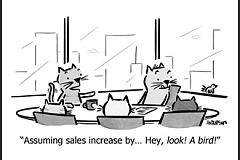 There are a host of obstacles that often impede us from achieving our full potential, but none is more important than the obstacles within us that we have created. Unconsciously, we will often attribute our challenges and downfalls to those things outside of us.
There are a host of obstacles that often impede us from achieving our full potential, but none is more important than the obstacles within us that we have created. Unconsciously, we will often attribute our challenges and downfalls to those things outside of us.
Perhaps it is an unrealistic supervisor or boss, or a caustic environment filled with annoying coworkers. No doubt, these are significant factors that contribute to our productivity and success, but they are not the sole reasons. Why we are happy or unhappy, successful, unsuccessful, productive, or nonproductive is based on our internal perspective, which determines how we define those things.
How we choose to approach and interpret the world around us determines our reality.
Our Inner Child
One of the most significant characteristics that influence our perception of reality is our inner child; it affects us all! Many of the experiences we acquired as children often stick with us well into adulthood. Positive and negative experiences as a child imprint on our subconscious and create beliefs about ourselves, which in turn influence our behavior.
From these childhood experiences, we can develop positive and productive behavior. [quotesright]On the other hand, and this is more common than most people realize, we develop nonproductive behavior. [/quotesright]
If we develop a negative self-image during childhood, we are then apt to develop false beliefs about ourselves, which in turn create a host of negative emotions that then can lead to negative coping behavior. In these cases, we see a pattern that begins with our childhood and contributes to the development of our adulthood.
First developed by Carl Jung, the concept of the inner child is considered a part of our subconscious. It represents our personality when we were children.
This child-like personality is a product of the events we were exposed to prior to puberty, and in some cases, those events could have been traumatic. This is not to say the child was necessarily exposed to something we might consider heavy, like abuse, neglect, or significant loss, even though such childhood events have profound impacts on us as adults.
The Impact
However, due to the hypersensitive nature of the child during this developmental time, events that we might consider benign as adults can come off as traumatic to the child, and as such create negative cognitions, also known as false beliefs.
For example, a father may tell his child to go to his room for whatever reason, and then spend time with another child. Or a mother who is overwhelmed with life may momentarily forget about her child at daycare and is late picking the child up.
As adults, it is easy to see these events as not out of the ordinary, and far from being abusive or “traumatic.” However, for the child, it can be a big deal. These hypothetical scenarios are only examples, but they present the genesis of false beliefs that can form the adult into insecure, self-doubting, miserable wretches if not addressed.
Identifying and addressing the false beliefs that were instilled in us as children are critical factors to achieving our full potential and productivity as adults. Otherwise, we may go through our entire lives burdened by a false belief and never realize it!
There is a ‘Tell’: The ‘I statement’
In many cases, our personal false beliefs can usually be narrowed down to just a few archetypal statements that always begin with “I.” Many of us have buried deep down in our subconscious the “I don’t matter” or “I’m not good enough” false beliefs. These false beliefs are typical and relate to the above-mentioned examples.
For the child who got sent to his room, banished from the presence of his father, only to observe his father spend time with another sibling, a question of self-worth may be manifested. Deep down, the child may ask himself, “Am I not good enough for my father? If I’m not good enough for my father, how can I be good enough for anyone or anything?”
The same self-doubts may occur in the child who realizes they were forgotten or perceived as abandoned because the mother was late picking them up: “I obviously don’t matter enough to be remembered. If I don’t matter to my mother, why would I matter to anyone else?”
This is some heavy stuff, and as a parent, it may give you pause. Nevertheless, the developmental years of a child are significant, which means that YOUR developmental years were also significant.
[quotes]Like a hot iron, these false beliefs brand themselves onto our subconscious, our inner child.[/quotes] And, from these moments on we can live our lives based on these false beliefs without even realizing it.
As adults, we may unconsciously embrace the false belief or desperately fight it.
The child who develops the “I’m not good enough” false belief may spend their entire adulthood in a sense of profound insecurity, proving to the world that by God! They are good enough! [quotesright]They present an image of control, and/or perfectionism, that is displayed in success after success; however, in many cases, it is a hollow façade of inauthenticity. [quotesright]
On the other hand, those who embrace the “I’m not good enough” false belief as truth don’t consider themselves capable of success and will often not bother with the steps of achievement. Why should they? They are not good enough to obtain success, and if they do, they must pretend that they are something that they are not – #Imposter Syndrome!
[quotes]Very similarly, the same type of maladaptive behavior exists with those dealing with the “I don’t matter” false belief.[/quotes] There is either an acceptance of this belief or a battle to prove otherwise.
People who genuinely believe that they don’t matter routinely find themselves in relationships, both personal and professional, that are abusive. They will accept abuse because deep down inside they really believe that they are irrelevant and the negative events that they incur are not only justified but normal.
On the Flipside…
To prove to themselves and everyone else that they do matter, adults will overtly involve themselves with everything that is going on. They will go out of their way to insert themselves into almost any scenario that demonstrates not only their presence but their significance: I do matter, damn it! Regardless of what you think about me, I am here!
[quotes]The fact of the matter is that we all know people like this.[/quotes] Moreover, if we're being honest with ourselves, we may admit that we are one of these people. If a boss is tyrannical, or a talented employee is unassertive, there may be something more than just petty or immature behavior going on.
The same is true for some who believe they are imposters at what they are doing, and fearful that someone may discover their inadequacies. For others, there may be a complete meltdown, or depressive withdrawal when something spoken triggers a false belief.
A Captive of False Beliefs
These “lies” that we have come to believe about ourselves probably have origins that are decades old. [quotesright]As a result, we often become captives of these false beliefs, doing everything we can to either prove them right or wrong and not even realizing it. [/quotesright]
Thus, when this behavior is witnessed or exercised, it is important to not only take note but realize that there usually is a reason. By doing this, one can achieve not only a sense of clarity about oneself and others but acquire patience as well. Becoming aware of negative behavior is smart – understanding where that behavior comes from is wise!
Getting Help
If you find yourself struggling with these issues, consider seeking out a qualified therapist. [quotesright]In this Covid based society in which we currently exist, both face-to-face and online treatment options are available and usually just a “click” away. [/quotesright]
To ensure that you are utilizing the best counselor for your needs, compile a list of suitable questions. For example, inquire if the therapist is licensed and for how long. Ask how much experience they have dealing with inner child therapy or whatever issue that you wish to address.
If your health insurance provides mental health coverage, make sure to inquire if they take insurance, as many mental health professionals do not, and only take self-pay.
Furthermore, realize that not all therapists are providers of medication. Within the mental health realm, psychiatrists are the only professionals that prescribe medication based on your mental health needs.
On the other hand, psychologists, counselors, and social workers do not prescribe but are arguably more interactive regarding talk therapy. There are a host of options that present a solution to your mental health needs; nevertheless, the hardest thing sometimes to do is take the first step!
Exclusive by John A. Wheeler, PhD, NCC, MDiv, SEAL
Licensed Professional Counselor
Email : drjohnwheeler@pathfinders.net
Website : pathfinders.net









